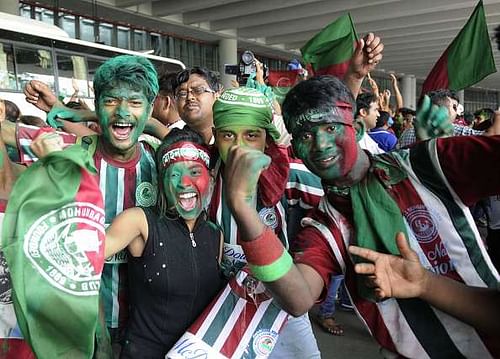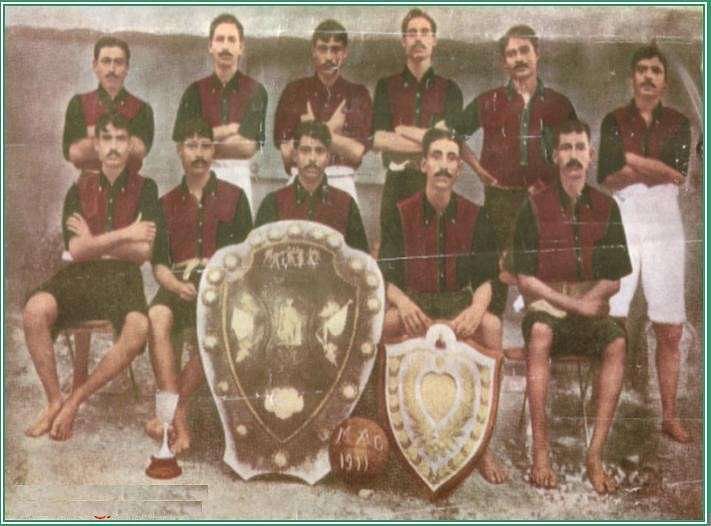
Five glorious moments in the history of Mohun Bagan
Football was introduced to India in the mid-nineteenth century by the British. To give India a taste of football tournaments, Durand Mortimer, the foreign secretary of India introduced the Durand Cup in the year 1888. Five years down the line, the IFA Shield was introduced. Calcutta turned out to be the hub for football in India. However, the clubs who rose to prominence then were mainly British clubs comprising players from the army or their elite officials.
Then came into existence one of the first clubs of Bengal, Mohun Bagan. On 15th of August, 1889, the club was introduced to the game by three aristocratic families of Bengal, and Bagan’s first match was against Eden Hindu Hostel. Their first participation in tournaments was in the year 1893, where they locked horns with local opposition, but with little success.
The man who, for the first time initiated a paradigm shift in the body language and the verve in the players was Subedar Major Sailen Bose. Bose’s army background meant that he instilled a sense of discipline into every player and trained them in the most spartan way possible to bolster their abilities and to enhance their resilience. This man changed the face of Mohun Bagan, and The Mariners’ long and fantastic legacy began.
We pick the five most glorious moments in the illustrious history of the club.
#1 IFA Shield triumph in the year 1911
The IFA Shield was founded in 1893, and for the initial three seasons, no native clubs were allowed to participate. Mohun Bagan was allowed to play for the first time in the year 1909.
Despite a victory against YMCA in the first round, Bagan were knocked out in their first participation after they were thumped by Gordon Highlanders, who eventually went on to become the champions of the tournament.
The next year failed to beget any different result for The Mariners. Mohun Bagan did drub St. Xavier in the first round but was again trounced by Rifle Brigade in the second round. After unrelenting defeats in the IFA Shield, the management decided to shoulder Shibdas Bhaduri with the responsibility of forming a good squad for the next edition.
Shibdas Bhaduri, after a stringent selection process, came up with a team that comprised the likes of Hiralal Mukherjee, Srishchandra Sarkar, and Rajendranath Sengupta.
Mohun Bagan started their IFA Shield campaign against St. Xavier on 10th of July. Riding on a brace from Bijoydas Bhaduri and a neat strike from Abhilash Ghosh, Bagan made it to the next round thumping Xavier's comprehensively.
The next game for Bagan was against Calcutta Rangers Club at Customs Ground. Given their jinx in the second round, Bagan were hell-bent to prove a point. To add to their woes, the damp conditions after a heavy downpour made things a lot more difficult.
A brace from Sibdas Bhaduri helped Bagan to sail through to the next round thereby shattering the second round jinx. Mohun Bagan was pitted against Rifle Brigades in the next round, who had ousted Bagan in the previous edition of the tournament. Bijoydas Bhaduri, who was quite an architect in paving Bagan’s way to the quarter-finals so far, was affected by the demise of his close friend before the match.
However, he exhibited nerves of steel and scored the solitary goal of the match, dodging past three defenders with ease and took Bagan to the semis for the first time in the IFA Shield in three years of their participation.
Mohun Bagan was up against the mighty Middlesex Regiment in the semi-finals. Both the teams matched each other blow for blow. Middlesex Regiment drew first blood through their skipper, Sgt. Piggot. Kanu Roy restored parity for Bagan after he unleashed a pile-driver from a long range that blasted into the net.
The replay was scheduled a day later in damp conditions. The match was plagued with some unfortunate incidents when Middlesex skipper, Sgt. Piggot had to be taken off the field after sustaining a crucial blow in his eye. After Sgt. Piggot’s injury, Mohun Bagan wreaked havoc to the Middlesex rearguard, netting 3 valuable goals to polish off the rout and advance to the finals, which was the maiden feat by any Indian club then.
The final, on 29th of July, saw Bagan pitted against East Yorkshire Regiment, who were undoubtedly one of the best outfits of that time.
Much to the disappointment of the crowds, who were cheering the home team vociferously, Jackson blasted a free-kick in the net drawing first blood for East Yorkshire Regiment. Mohun Bagan were hell-bent to not relinquish to their British counterparts.
The half-time break proved to give the team a kick start as a transformed Bagan put on a display. With 10 minutes to go, Shibdas Bhaduri scored a stunner after taking the British rearguard by storm with some fancy footwork. With a couple of minutes to the final whistle, Abhilash Ghosh razed the Yorkshire defence to score the winner.
This victory of Bagan was amplified because of its sting in national importance. In an era of political bedlam, Mohun Bagan stamped their authority with an important victory over the British team.

